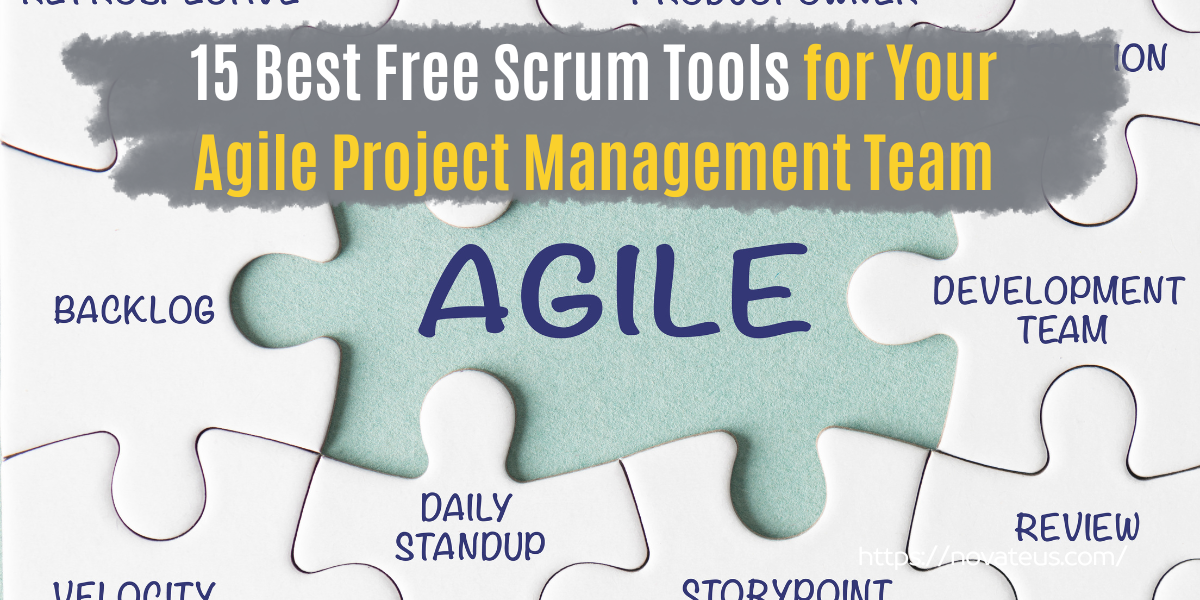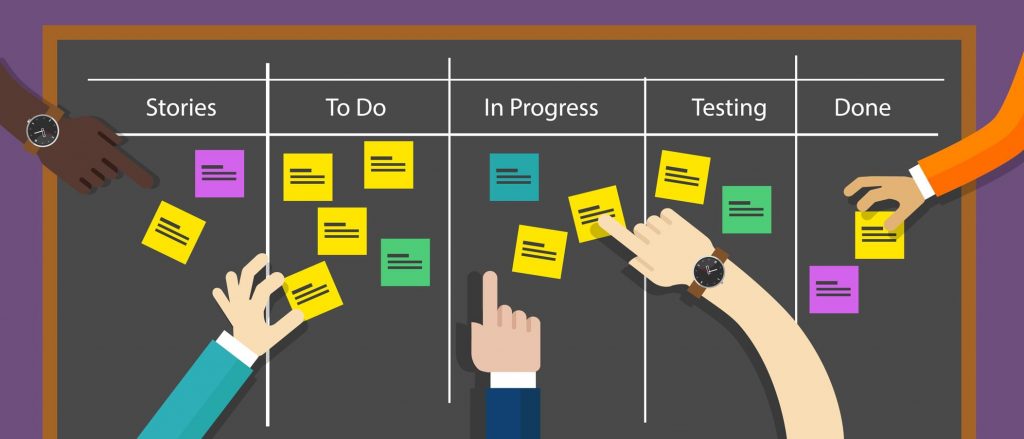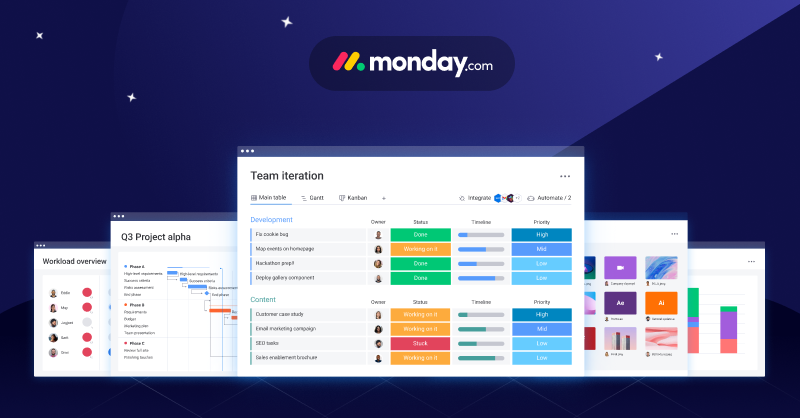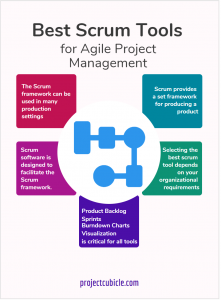15 Best Free Scrum Tools For Your Agile Project Management+ Pros and Cons


You can enhance your project management strengths and ensure the accomplishment of your projects with the help of these best free scrum tools for agile project management.
Best Free Scrum Tools-What Do We Mean By Agile Tools?

Agile” literally means, “capable of moving fast and readily.” The same notion remains for agile application development or other software processes. Teams finish their tasks on time without pilling up the assignments and ignoring the quality through the agile process. However, the endpoint question is which agile development tools are worth using for your scrum team that escalates the work efficiency and goals?
Here is a list of the best free scrum tools!
1 Monday.com:
Monday.com is the top scrum management platform in the business market. It is a universal application that offers a simple architecture to customize, edit, manage and submit assignments for scrum teams. On top of that, The tool uses both agile and hybrid approaches.

Pros: |
Cons: |
|
|
2 Wrike:
Wrike is great for linking various projects and increasing team productivity. Team members review new, ongoing, and finished tasks in a single location. Thanks to its fully customized team sprinting dashboards. Furthermore, users may flip between Kanban boards, interactive drag-and-drop Gantt charts, and workload views to see priorities per Wrike’s straightforward interface.
Pros:
- User-friendly and intuitive
- Access to a range of customizable dashboards
- Excellent email integration
Cons:
- The commenting system could improve
- Not suitable for small organizations
3. Jira:
Jira, by Atlassian, is one of the most popular agile project management platforms for software development enterprises and large corporate organizations. It has countless features, including configurable backlogs, scrum boards, and reporting choices.
Pros:
- It enables you to design workflows adaptable to your business’s working style.
- Provides centralized management for all products using the Atlassian Cloud.
- You can make tasks, subtasks, spikes, and epics using it.
Cons:
- Challenging to assemble, and learn how to use it correctly takes a while.
- The overwhelming number of features makes it difficult to use sometimes.
4. Zoho Sprints:
Zoho Sprints is one of the most adaptable online scrum solutions ever created. The tool enables you to deploy solutions in continuous sprints. Agile teams plan, monitor, and deliver the best work to their clients with the help of this product management tool, known as sprints.
Pros:
- Easy to schedule meetings for daily stand-ups and sprint evaluations
- Numerous opportunities for customizing
- Easily create a work item from feed messages
Cons:
- Not properly integrated with other Zoho applications
- Customer support is scarce
- Lack of Kanban boards
- No user’s cumulative by-project timesheets
5. Scrumwise:
Scrumwise is a logical tool with specific scrum capabilities. It assists you in achieving your sprint objectives, managing your backlog, visualizing your work, and keeping track of your progress using Kanban boards.
Pros:
- Scrumwise makes and manages backlogs.
- You can create your own customized Kanban and Scrum boards.
- Scrumwise helps you concentrate on your scrum project.
- It offers the simplest solution to increase the efficiency and happiness of your Scrum teams.
Cons:
- Inflexible access control feature
6. Quickscrum:
Next, QuickScrum is an easy-to-use tool that won’t take much time to learn. You may track the progress of a project, organize sprints, and produce reports using this tool. Additionally, this tool enables you to allocate capital more effectively, increase speed deliveries, and ultimately improve income.
Pros:
- Provides many integrations.
- Time logs for projects
- Burndown chart and backlog management
- Swift and simple onboarding
Cons:
- The tool can have low speed.
7. Pivotal Tracker:
A pivotal tracker facilitates interaction and provides dynamic tools for tracking advancement. This tool excels at task management and aids in project management, performance tracking, and future projection.
Pros
- Excellent analytics capabilities
- Allows for real-time collaboration so you can view and respond to all changes in scrum projects.
- Simple to evaluate earlier projects
Cons:
- Limited functionality compared to rivals
- Overwhelming amounts of information
- For people without programming experience, this software has a modest learning curve.
8. ScrumDo:
ScrumDo provides excellent scrum operational solutions. You can more accurately and systematically track the progress of your projects by using ScrumDo’s powerful reporting tools.
Pros:
- Profiles for customized reporting
- Process tracking built-in
- Iterative process using drag and drop
Cons:
- Its overall UI and UX need improvement.
9. Trello:
Trello is an innovative scrum management tool for your team’s chat, email, and project-based interaction. This tool is available in free and premium editions to increase automation, cooperation, and supervision.
Pros:
- maintains device synchronization.
- It assists you in integrating several app types to speed up business operations.
- enable future project management.
Cons:
- No free trial
- Internet is necessary to use the tool
10. Easy Redmine:
Redmine is an accessible project management application. Big businesses worldwide use this tool. Redmine is a revolutionary norm in the best scrum tools for agile management.
Pros:
- simple project hierarchy setup
- introduces a specific Agile board plug-in
- outstanding bug monitoring and record-keeping capabilities
Cons:
- The agile board hides parental tasks
- To handle data, you might need to create a lot of filters
- No Ad/copyright permissions
11. Nutcache:
Nutcache is a project management application that helps you in organizing and monitoring every part of your project, using a complex toolkit of color-coded timetables, task organization queues, and data analysis.
Pros:
- Excellent time-tracking capabilities
- New hire integration is simple
- Simple to use
Cons:
- Third-party integrations
- Complex security measures
12. Asana:
Asana makes it simple to assign tasks, automate procedures, and collaborate. Simple Kanban Boards, Lists, and Cards are available, along with a simple-to-use user interface.
Pros:
- large-scale integration
- easy to set up and operate
- you can personalize it to meet your needs
Cons:
- no time management tools.
- chat and note-taking features are lacking.
13. ClickUp:
ClickUp is an online productivity tool and cloud collaboration project. It facilitates thorough time and task management and business unit interaction.
Pros:
- Provides a customer-focused strategy.
- For necessary services, it offers a free plan.
- Offers an effective dashboard view.
Cons:
- Not the best tool for managing projects by yourself.
- The reporting capabilities are poor.
14. VivifyScrum:
A web-based scrum method management tool, Vivify scrum manages all your projects in one location. It provides burn-down graphs, agile panels, and scrum metrics charts.
Pros:
- Enables rapid task assignment, labeling, and typing
- Provides tags and card varieties.
Cons:
- Does not permit sorting of product backlog in the dashboard view.
- There are no third-party integrations.
15. Targetprocess:
For product managers, releasing train engineers, project managers, and agile instructors, Targetprocess is an excellent scrum team management tool. It gives you the option of expanding your agile transformation.
Pros:
- Reports to identify trends.
- You can choose between custom and regular views for each user.
- An attentive customer service team
Cons:
- excludes tracking iterations.
- no undo options

Photo credits: Project cubicle
These best free agile tools support Scrum, Kanban, Scrumban, or other hybrid agile methodologies. Your project success depends upon your choice of top tools and the quality of your deliverables. Above mentioned best free scrum tools can scale your mode of work, management, and submission. Besides, you can share these tools with your scrum team too!

